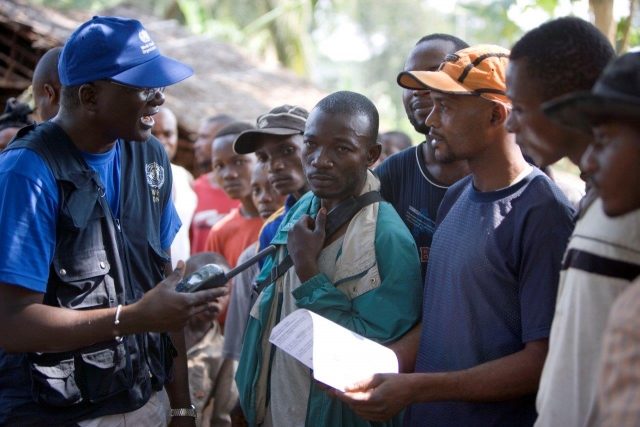Ethiopia conference to consider $106.8M strategy for WHO to tackle disease outbreaks and other health emergencies in Africa
 Addis Ababa, 18 August 2016 – With more than 100 public health emergencies occurring each year in the African Region, Health Ministers attending the 66th session of the WHO Regional Committee for Africa will consider a $106.8M strategy to tackle the public health emergencies that threaten everyone in Africa and disrupt the regional economy.
Addis Ababa, 18 August 2016 – With more than 100 public health emergencies occurring each year in the African Region, Health Ministers attending the 66th session of the WHO Regional Committee for Africa will consider a $106.8M strategy to tackle the public health emergencies that threaten everyone in Africa and disrupt the regional economy.
At the WHO meeting taking place in Addis Ababa from 19-23 August 2016, Health Ministers from the 47 countries in the Region will decide on a number of policy commitments in the Regional Strategy for Health Security and Emergencies 2016–2020. One of the strategy’s most significant commitments, in direct response to the many outbreaks seen across the continent, is that by 2018, at least 80% of the 47 countries will have tested and funded all-hazards preparedness plans, conducted outbreak and disaster risk analyses and mapping, and implemented policies and guidelines to support International Health Regulations (IHR) and Disaster Risk Management (DRM) implementation.
“In our globalized world, diseases know no boundaries. We need stronger collaboration to protect national, regional and global health security. The implementation of the regional strategy for health security and emergencies would strengthen the capacity of countries in the Region to prepare for, prevent, detect, respond to and quickly recover from emergencies in a predictable, dependable and accountable way,” said Dr Matshidiso Moeti, WHO Regional Director for Africa.
At the meeting that will review modalities of contributing to and managing the African Public Health Emergency Fund (APHEF), Dr. Moeti will advocate for renewed commitment from Member States to sustaining the Fund. It is notable that with the frequent emergencies in the Region, the needs for assistance continue to increase. Recently, APHEF resources have funded vaccination campaigns to contain the current outbreaks of yellow fever, and established emergency treatment centers to manage cholera in drought-stricken southern Africa.
Out of the 100 public health emergencies that occur in the African Region every year, infectious diseases account for 80%, disasters for 18%, chemical poisoning and acute severe malnutrition account for only 2%. The recent Ebola epidemic in West Africa received the lion’s share of attention, but national governments need dedicated resources to contain many other diseases, with looming threats on the horizon. Antimicrobial resistance (AMR), for example, threatens the effective prevention and treatment of an ever-increasing range of infections.
“Countries can do more to tackle these outbreaks, many of which are preventable, by addressing the causes and being better prepared to avoid the current unacceptably high death, disease and disability, resulting in subsequent socioeconomic disruptions,” the Regional Director added.
Outlining the risk across the continent, WHO mapped out the impact of 15 tropical diseases—ranging from anthrax to Ebola to Zika—in a report released in May 2016. These maps examined the ecological zones where people can acquire the disease along with the places where transmission has been documented. The report also charted the impacts of ten different contextual and environmental factors—ranging from population growth and urbanization to hunger and conflict.
The Regional Strategy would establish a target that by 2020, at least 80% of Member States should have a fully functioning public health emergency operation centre (EOC) and a functional national laboratory system and network that meets minimum standards. Over 80% of Member States should have an adequate health work force to respond to outbreaks and health emergencies and at least 90% of Member States should be implementing the Integrated Disease Surveillance and Response (IDSR) including event-based surveillance systems with at least 90% country coverage by 2020.
In line with the guiding principles of the Regional Strategy, WHO and partners will work in strong collaboration and multisectoral engagement to prevent, contain and control emergencies in the Region.
Once the Regional Strategy is made available, decisive actions will be needed from Member States and their development partners for implementation, ensuring that people in Africa and the world are better protected from outbreaks and other health emergencies. The establishment of resilient health systems that can withstand the shock of disasters and potential damage from emergencies is essential for Africa to continue to grow.
___________________________
For more information, please contact:
Dr Ibrahima Soce-Fall, Regional Emergency Director, WHO African Region, Tel +47-241-39695, +242065104619, socef [at] who.int
Collins Boakye-Agyemang, Regional Communications Adviser; Tel: + 242 06 520 6565; Email: boakyeagyemangc [at] who.int
Loza Mesfin Tesfaye, Communications Officer, WHO AFRO; Tel: +251 911 144 194; Email: tesfayel [at] who.int
Fabienne Aboua, Communications Officer, WHO AFRO; Email: abouaf [at] who.int
Pieter Desloovere, Communications Consultant, WHO AFRO; Email: deslooverep [at] who.int


